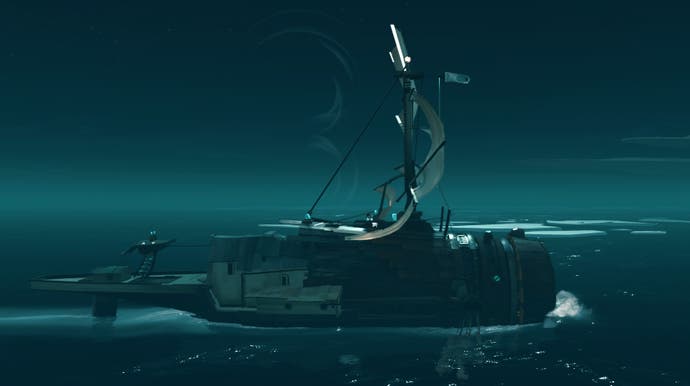Far: Changing Tides review - a tense and mournfully beautiful sequel
Soak it up.
In an empty world like that of Far: Changing Tides, it's hard not to become overly attached to the stupidest things. A toy carousel. A potted plant. A wooden duck. A delightfully regal statue of a deer.
But immobile in the deep, dark depths of the ocean, my furnace dark and cold, I was left with no choice, was I? It was either stay here, shoals of fish circling my ankles, or sacrifice that wooden duck and hurl it into the engine's hungry mouth. Yes, I'm still pretty upset about it.
Ostensibly, of course, nothing I recover from the ocean floor or the insides of water-damaged homes have any sentimental value. Everything I scavenge during my journey has but one purpose: to help power my vehicle, a strange boat-cum-submarine-cum-land-car thing that propels Toe - that's us - forward.
Yet I can't seem to help myself. Yes, the cans of fuel can be burned. Yes, I'll sacrifice the discarded suitcases and bags - I wonder who packed them? Where they are now? How did these bags get here? - but when it comes to the more unusual stuff, the wind-up carousel and the deer and a ballerina music box, I want to keep them. I want to cherish them. Because if I didn't, Toe wouldn't have anything at all. And more than anything, I feel Toe should have something. We have no idea who they are or what they've been through, but I sense it's a lot. I sense it's enough for one small lifetime.
It's very hard to describe what Far: Changing Tides is about because unless you spent time with its predecessor, Far: Lone Sails (Edwin recommended it back in 2018; I absolutely fell in love with it) you've probably never played anything like it. One part puzzler, one part vehicular adventure game, it feels and looks a little like PlayDead's Limbo and Inside, but without the spooky shenanigans and WTF-ness. You're told nothing about who you are, where you've been, where you're going, or even how you're going to get there, and yet you learn enough to get you going. The rest you pick up - sometimes quickly, sometimes not - along the way. There are no button prompts. No waypoints. No audio diaries. Everything you uncover and everything you do can only be revealed through your own curiosity.
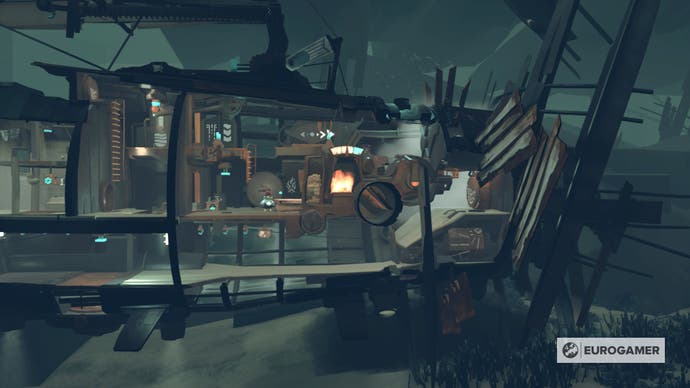
Toe can't die, nor do they encounter any enemies along the watery way, although you should keep your boat in tip-top condition. From the outside, it's seemingly cobbled together with wood and steel and chewing gum and desperate hope. On the inside, it's a bustling hive of pistons and gears and gadgets. You'll soon come to think of it not just as your vehicle or even your home, but your only friend and travelling companion.
While Lone Sails could be completed in a single sitting, Changing Tides is an altogether more languid affair. Topping out at around 10 hours - well, depending upon how quickly you can solve those puzzles, of course - it's not laboriously lengthy, either, but it gives us longer to sit in this world and, pardon the pun, soak up its ambience. The mechanics should be familiar to those of you who've played the original game, and not too tricky to grasp for those who haven't; you use your sails to glide as much as possible and fire up your engine when wind power is not available. This time, though, you're also able to dive into the ocean, too, either in or outside of your vehicle.
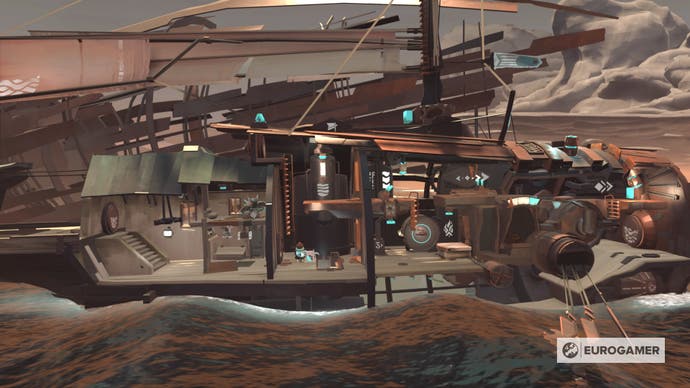
Given it's a longer adventure this time around, there's so much more to explore, from the flooded streets you set off in, to the frozen, iceberg-crested waters you'll navigate through later on, and I adored every moment of it. The score is an achingly perfect accompaniment, as much a part of the experience as the visuals and puzzles, but sometimes it's just you and the sound of the sea, and that's wonderful, too.
There are better visual cues to help you identify the wind currents and maximise your cruising speed, which makes it infinitely easier to decide when it's time to shift from wind to furnace power. And occasionally, Toe will find their route obstructed, so they'll hop off their boat/submarine/truck thing and explore the world to find a way around it. Well, what's left of it.
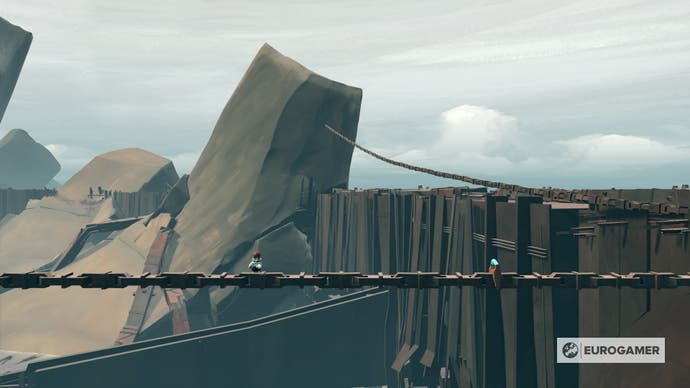
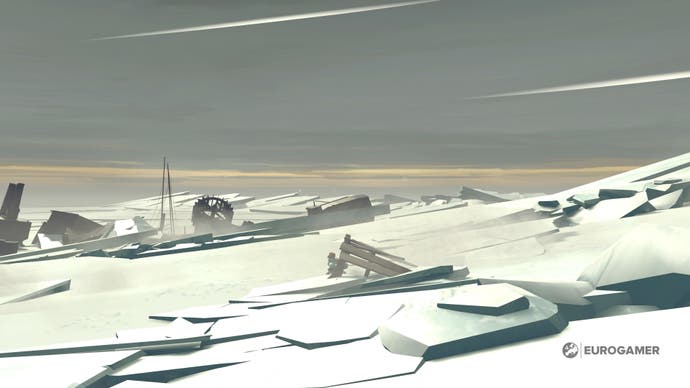
It's here that Far: Changing Tides truly sings. Again, you're never explicitly told anything, but the ruins of the world around you and the clues its people left behind - the flooded streets and the rusted prefabs and the thin mattresses and empty tin cans that litter the rooftops - tell you enough. Rusted steel pokes out of the water like copper bones. Cranes tower over the waves, teetering dangerously in the gusty winds. Some of the structures that stretch out of the waves are so strange, so alien, it's hard to know what function they might have once served. But you know that whatever they once did, they do no more. What was once a cluttered, industrial landscape now lies silent. Cold. Dead.
There were a couple of moments where my fuel rations were terrifyingly low, though. I have to shoulder some of that blame - I've already told you that I couldn't burn everything I discovered, and three-quarters of my cherished collection was still in pride of place when I finally completed my adventure - but I also accidentally headbutted the button that moves your salvage into the furnace when there was already something burning in there, too, wasting fuel. The key is to be vigilant and explore thoroughly, including under the waves, and utilising everything you find. All interactable items are daubed in the same sky-blue colour, making it easier to discern between environmental clues and interactive puzzle elements.
"Far: Changing Tides is every bit as bewitching as its predecessor..."
Is it perfect? Not quite. The limited perspective means you'll struggle to take down the mast in time before they collide with an obstacle - unfairly forcing you to make repairs to your ship when repair tools are irritatingly scarce - and occasionally, with too many interactable items together in one place, you may find you accidentally grab onto the wrong item or moving the wrong switch or gear.
The puzzling this time around, though, is almost perfect. Neither frustratingly opaque nor insultingly easy - and sometimes its predecessor was guilty of both - I found I moved through Changing Tides at a satisfying pace without too many hold-ups and just one peculiar puzzle that nipped at my nerves. They come in different guises, too; one puzzle may task you with making modifications to the ship, for instance, whilst other times, you're working to open a rusty gate. I think I loved those latter ones more; it gives Toe an excuse to further explore this watery world.
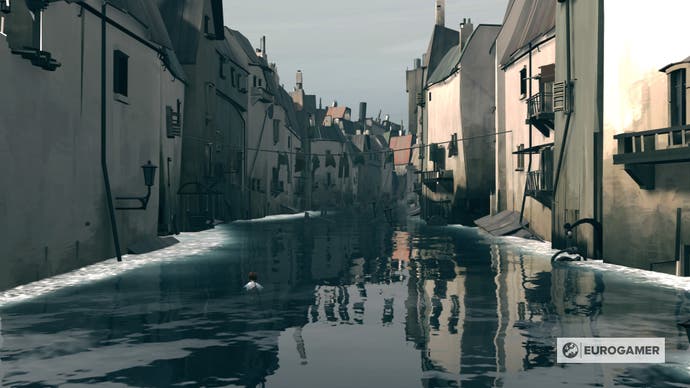
There's more, too, but some of Changing Tides' biggest surprises are its biggest spoilers too, so let's leave it there. I can say, however, that its most significant story beats are a gloriously satisfying conclusion to Toe's journey. Sure, it's possible that the long sailing sequences may be too uneventful for some; but this is one of those times where you've no choice but to sit back, chill out, and the journey... regardless of where it's taking you.
Having adored the first game, I was delighted that a sequel - or "companion piece" - was coming, but admit I was apprehensive, too. I worried that Far: Lone Sails' unique appeal couldn't be stretched to encompass a sequel with a longer runtime, and wasn't sure the puzzling would be so endearing the second time around. If you too are concerned about the same things, worry not. It turns out Far: Changing Tides is every bit as bewitching as its predecessor thanks to its stunning presentation, haunting soundtrack, and wholly unique gameplay and puzzle mechanics. Don't miss it.
